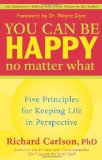
Five Principles for Keeping Life in Perspective
Reviewed October 28, 2010.
New World Library, Novato, California, 1997. 141 pages.
You Can Be Happy No Matter What hit the spot for me. Some nice, practical advice on being happy.
Since my husband left me a few years ago, and I'm still going through a divorce, my life has not turned out the way I planned -- not at all. But I'm bound and determined that I don't want choices someone else made to ruin my happiness. Richard Carlson gives you some nice practical advice to help yourself be happier more of the time.
Here are some passages I liked:
When you can recognize the feeling of happiness when it’s there, you will realize that this feeling is what you have been looking for all along. The feeling isn’t leading somewhere else — it’s the goal, not the means to a goal. If the bride-to-be understands that her happiness comes first from within, she can make the decision to marry or not to marry from a place of wisdom, not from a place of lack. If she is already happy, the marriage will also be happy. If the couple then decides to have children, the children will grow up in a happy environment without the pressure of being someone’s source of happiness. The same will be true throughout the life of any happy person. Happiness breeds a happy existence and a joyous way of looking at life….
Happiness is right now. Your life is not a dress rehearsal for some later date — it is right here, right now. The invisible quality of happiness we have all been looking for is right here in a feeling.
He reminds us that we don't have to be led by our thoughts down unhappy paths:
There’s nothing to fear from thought itself, once we understand that it’s just thought.
Perhaps the greatest misinterpretation of this principle is to believe that the goal is to control what you think about. It isn’t. The goal is to understand thought for what it is: an ability you have that shapes your reality from the inside out. Nothing more, nothing less. What you think about is not ultimately going to determine the quality of your life, but rather the relationship you have to your own thinking — the way you manufacture your thoughts and respond to them. Do you hear your thinking as reality, or as thought?
Another insightful comment was to lower our tolerance for stress, which I interpreted as meaning to be more aware of your feelings if you want to have positive feelings:
Surprisingly, the solution to stress is to begin to lower our tolerance to stress. This is the opposite of what most of us have been taught, but it is the truth. Lowering our tolerance to stress is based on the simple principle that our level of internal stress will always be exactly equal to our current tolerance. This is why people who can handle lots of stress always have to do just that.
People with extremely high levels of stress tolerance might end up with a stress-related heart attack before they begin to pay attention to what the stress is telling them. Others may end their marriage or find themselves in a recovery center for alcohol or drugs. People with lower tolerance might begin paying attention to their stress earlier, when their job first begins to seem overwhelming or when they find themselves snapping at their children. Still others, who can’t tolerate stress at all, sense that it’s time to slow down and regain perspective when they start merely having negative thoughts about their friends or family.
The lower our tolerance is for stress, the better off we are psychologically. When our goal is to feel our stress as early as possible, we can “nip stress in the bud” earlier, and return more quickly to a positive feeling state. We have choices; in fact, we have a series of “choice points,” in any situation. The longer we wait to disregard the stressful thoughts, the more difficult it becomes to bring ourselves back to our natural state of mind. Eventually, with practice, any of us can get to the point where we are aware of our negative thoughts before they pull us off track.
The basic format of the book covers five principles for being happy, and then talks about how to apply them. The chapters are short and simple, but there are definitely some dynamic principles here. The chapters made nice selections to read at the beginning of the day to remind me of things like this:
To a happy person, the formula for happiness is quite simple: Regardless of what happened early this morning, last week, or last year -- or what may happen later this evening, tomorrow, or three years from now -- now is where happiness lies. Happy people understand that life is really nothing more than a series of present moments to experience. Mostly, they understand that right now, this very moment, is where life is truly lived.

